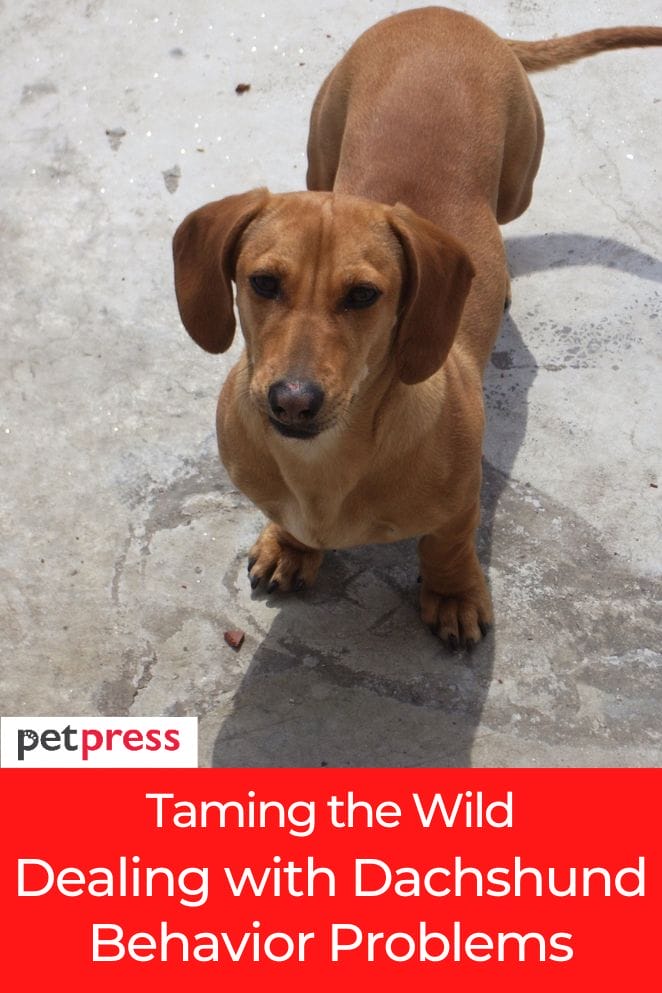
Hello there, fellow Dachshund lover!
Assuming you’ve had the delight of having one of these cute wiener canines in your day-to-day existence, you’re very much aware of the special behaviors that accompany them.
Dachshunds are charmingly particular, yet now and again, these peculiarities can present difficulties.
In this article, we’ll delve into the typical behavior issues Dachshunds exhibit, explore what causes these behaviors at their core, and offer you valuable advice on how to effectively manage and enhance your furry companion’s conduct.
Common Dachshund Behavior Problems
Dachshunds may be small in size, but they sure pack a big personality punch. Here are some of the most common behavior problems you might encounter:
Excessive barking
Excessive barking is a trait you’ll often find in Dachshunds.
They’ve got this incredible guarding instinct that keeps them on their toes, always ready to alert you, no matter how small the perceived threat might be.
It’s quite endearing, I must say, but it can also lead to what feels like endless barking sessions.
Whether it’s the friendly mailman making a routine visit or a passing squirrel they’ve decided to challenge, Dachshunds have a knack for making their concerns heard loud and clear.
Digging
These little furballs have a natural penchant for digging.
It’s in their DNA as they were originally bred to hunt burrowing animals like badgers.
Your beautifully landscaped garden might become their excavation site, and you may find your flower beds mysteriously transformed into craters.
Separation anxiety
Dachshunds are famous for their loyalty.
It’s a heartwarming quality, but it can sometimes flip into separation anxiety when they find themselves alone.
This can result in quite a bit of chaos – think chewing on your cherished furniture, a chorus of excessive barking, and even escape attempts to reunite with their beloved humans.
Aggression
Dachshunds are generally a friendly and affectionate bunch.
But, like any breed, you can find exceptions.
Some Dachshunds might display aggression, particularly towards other dogs or even people.
Usually, it’s a result of inadequate socialization or unfortunate past encounters.
Proper socialization and training can help, but it may still require some extra care.
Stubbornness
Dachshunds are incredibly smart, but they also come with a will as strong as their love for cozy blankets.
They can be a tad headstrong when it comes to training.
Sometimes, it seems like they’ve decided your commands are more like suggestions. This is where patience and consistency become your best friends.
Chewing
Dachshund puppies, in particular, have a natural instinct to chew.
Teething can exacerbate this behavior, and if they don’t have appropriate chew toys, they might turn to your shoes, furniture, or anything else within their reach.

Root Causes of Dachshund Behavior Problems
Understanding why your Dachshund behaves the way they do is crucial for effective problem-solving. Here are some common root causes:
Instinctual behavior
Dachshunds have a rich history as hunting dogs, particularly for hunting burrowing animals like badgers.
Many of their behaviors, such as digging and barking, are deeply ingrained instincts.
Digging served as a means to unearth prey, and barking was a way to alert their human companions to potential threats or prey.
These behaviors are still present in modern Dachshunds, even if they no longer have to hunt for their food.
Lack of socialization
Socialization is a crucial aspect of a dog’s development, helping them become well-adjusted and friendly pets.
If a Dachshund does not have enough exposure to other dogs, people, and various environments during their early months, they may develop fear or aggression towards unfamiliar situations or individuals.
This can lead to behavioral problems when they encounter new experiences.
Boredom
Dachshunds are intelligent and active dogs.
When they don’t receive enough mental and physical stimulation, they can become bored easily.
In their quest for entertainment, they may resort to problem behaviors like excessive barking, chewing on furniture, or digging up the yard.
It’s essential to keep their minds engaged through interactive toys, puzzles, and playtime to prevent boredom-related issues.
Anxiety
Dachshunds are known for their loyalty and attachment to their owners.
While this is a wonderful trait, it can also result in separation anxiety when they are left alone.
Separation anxiety can trigger destructive behaviors, such as chewing and excessive barking, as they seek comfort and reassurance in their owner’s absence.
Addressing separation anxiety may require gradual desensitization and training techniques to help them feel more secure when left alone.
Health issues
Sometimes, underlying health problems can manifest as behavior issues in Dachshunds.
Pain or discomfort due to conditions like back problems, dental issues, or allergies can lead to changes in behavior.
It’s essential to rule out any medical issues if your Dachshund’s behavior suddenly changes or worsens.

Tips for Managing Dachshund Behavior Problems
Now, let’s get to the good stuff – how to manage those behavior problems and enjoy a harmonious life with your Dachshund:
Exercise
Dachshunds may be small, but they have plenty of energy to burn.
Regular exercise is crucial to keep them physically and mentally satisfied.
Daily walks, playtime in a securely fenced area, and even fun games like fetch can help drain excess energy and reduce the likelihood of boredom-related behaviors.
Training
Consistent and positive reinforcement-based training is essential when dealing with Dachshund behavior problems.
Use rewards like treats, praise, and affection to motivate and encourage good behavior.
Be clear and consistent with your commands, and keep training sessions short and engaging to hold their attention.
Socialization
Early and ongoing socialization is key to reducing fear and aggression in Dachshunds.
Introduce your puppy to various people, dogs, and environments from a young age.
Positive experiences during socialization can help build their confidence and reduce the likelihood of developing behavior problems related to fear or aggression towards unfamiliar situations or individuals.
Mental stimulation
Dachshunds are intelligent dogs that thrive on mental challenges.
Provide them with puzzle toys, interactive games, and obedience training to keep their clever brains engaged.
Mental stimulation can be just as important as physical exercise in preventing boredom and undesirable behaviors.
Patience
Dachshunds can be stubborn, and behavior change may take time.
Be patient and consistent in your training efforts.
Avoid punishment-based methods, as these can lead to fear and further behavioral issues. Instead, focus on positive reinforcement and rewarding desired behaviors.
Seek professional help
If you’re finding it tough to navigate your Dachshund’s behavior issues, don’t be afraid to reach out for professional assistance.
A skilled dog trainer or behaviorist can offer customized guidance and techniques tailored to your dog’s specific quirks and challenges.
Be a responsible owner
Being a responsible Dachshund owner goes beyond just affection.
It involves meeting their physical, emotional, and medical needs.
Make sure they’re on a balanced diet, keep up with regular veterinary care, and create a safe and comfy environment for them.
Timely attention to any underlying health issues is crucial, as these can sometimes contribute to behavior problems.
Conclusion
Dachshunds undoubtedly bring boundless joy into our lives, but they also come with their own distinctive quirks.
By delving into the root causes of these behaviors and taking our advice on how to address them, you can foster a harmonious bond with your Dachshund.
This bond will be characterized by well-behaved and content companionship, seamlessly integrated into the dynamics of your family.
FAQs
Dachshunds can be great with children, but early socialization and supervision are essential.
Training, positive reinforcement, and providing distractions can help reduce excessive barking.
Yes, Dachshunds can adapt well to apartment living if they get enough exercise and mental stimulation.
Consistent crate training and positive reinforcement are effective methods for potty training Dachshunds.
- Does Cat Litter Melt Ice? The Complete Guide to Winter Safety - January 30, 2026
- Happy Tail Dogs: Understanding This Common Canine Condition - January 29, 2026
- How Cold Can Outdoor Cats Handle? Feline Winter Safety - January 27, 2026


GIPHY App Key not set. Please check settings